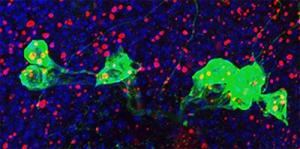Health
Mental health disorders common following mild head injury
A new study reveals that approximately 1 in 5 individuals may experience mental health symptoms up to six months after mild traumatic brain injury (mTBI), suggesting the importance of follow-up care for these patients. Scientists also identified factors that may increase the risk of developing post-traumatic stress disorder (PTSD) and/or major depressive disorder following mild mTBI or concussion through analysis of the Transforming Research and Clinical Knowledge in Traumatic Brain Injury (TRACK-TBI (link is external)) study cohort. The study was supported by the National Institute of Neurological Disorders and Stroke (NINDS), part of the National Institutes of Health. The findings were published in JAMA Psychiatry.
- Read more
- 375 reads
New Findings Reveal Surprising Role of the Cerebellum in Reward and Social Behaviors
A new study in rodents has shown that the brain’s cerebellum—known to play a role in motor coordination—also helps control the brain’s reward circuitry. Researchers found a direct neural connection from the cerebellum to the ventral tegmental area (VTA) of the brain, which is an area long known to been involved in reward processing and encoding.
- Read more
- 354 reads
Guinea Worm Disease Could Soon be Wiped Out, Experts Say
There were just 28 reported human cases of Guinea worm disease (GWD) last year, the U.S.-based Carter Center said Thursday.
- Read more
- 376 reads
NIH researchers rescue photoreceptors, prevent blindness in animal models of retinal degeneration
Using a novel patient-specific stem cell-based therapy, researchers at the National Eye Institute (NEI) prevented blindness in animal models of geographic atrophy, the advanced "dry" form of age-related macular degeneration (AMD), which is a leading cause of vision loss among people age 65 and older. The protocols established by the animal study, published January 16 in Science Translational Medicine (STM), set the stage for a first-in-human clinical trial testing the therapy in people with geographic atrophy, for which there is currently no treatment.
- Read more
- 327 reads
Clinical Trial Testing Fecal Microbiota Transplant for Recurrent Diarrheal Disease Begins
A research consortium recently began enrolling patients in a clinical trial examining whether fecal microbiota transplantation (FMT) by enema—putting stool from a healthy donor in the colon of a recipient—is safe and can prevent recurrent Clostridium difficile-associated disease (CDAD), a potentially life-threatening diarrheal illness. Investigators aim to enroll 162 volunteer participants 18 years or older who have had two or more episodes of CDAD within the previous six months.
- Read more
- 337 reads
“Zero polio transmission and health for all”, WHO Director-General gives new year’s wish to the people of Afghanistan and Pakistan
WHO Director-General Dr Tedros Adhanom Ghebreyesus highlighted WHO’s commitment to the final push to eradicate polio on a 4-day visit to Afghanistan and Pakistan - the only two countries where wild poliovirus cases were reported last year. He also commended the governments of both countries for their efforts to provide universal access to health services.
- Read more
- 322 reads
Gut microbes from healthy infants block milk allergy development in mice
New research suggests that the gut microbiome may help prevent the development of cow’s milk allergy. Scientists at the University of Chicago found that gut microbes from healthy human infant donors transplanted into mice protected animals exposed to milk from experiencing allergic reactions, while gut microbes transplanted from infants allergic to milk did not. The findings may inform research to develop microbiome-based therapies to prevent or treat food allergy.
- Read more
- 300 reads
The science is clear: with HIV, undetectable equals untransmittable
In recent years, an overwhelming body of clinical evidence has firmly established the HIV Undetectable = Untransmittable (U=U) concept as scientifically sound, say officials from the National Institutes of Health.
- Read more
- 352 reads
WHO Director-General concludes New Year visit to Ebola-affected areas in the Democratic Republic of the Congo
WHO Director-General Dr Tedros Adhanom Ghebreyesus traveled over the New Year to Ebola-affected areas in the Democratic Republic of the Congo (DRC) to review the response at this critical phase. Efforts to end the outbreak are continuing after recent disruptions, but further interruptions could have serious consequences, he warned.
- Read more
- 315 reads
NIH study implicates hyperactive immune system in aging brain disorders

In a study of flies, NIH scientists showed how the immune system may be a culprit in the damage caused by aging brain disorders.
- Read more
- 371 reads
Human Rights
Fostering a More Humane World: The 28th Eurasian Economic Summi

Conscience, Hope, and Action: Keys to Global Peace and Sustainability

Ringing FOWPAL’s Peace Bell for the World:Nobel Peace Prize Laureates’ Visions and Actions

Protecting the World’s Cultural Diversity for a Sustainable Future

Puppet Show I International Friendship Day 2020

